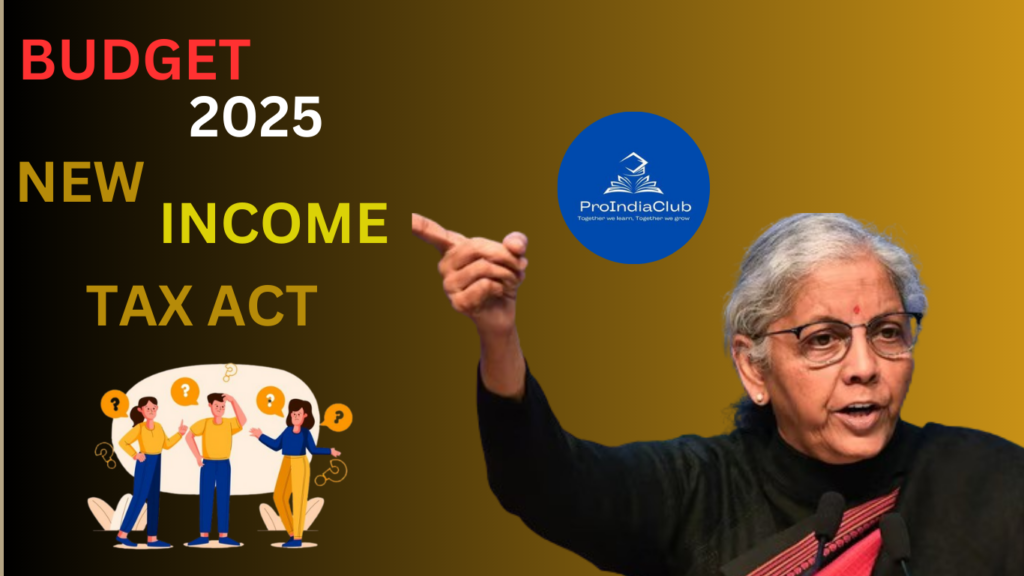
GST Registration Process Simplified
CBIC Simplifies GST Registration Process and Restricts Unnecessary Officer Queries The Central Board of Indirect Taxes & Customs (CBIC) has issued Instruction No. 03/2025-GST dated

New Delhi, February 1, 2025 — In a landmark announcement during the Union Budget 2025 presentation, Finance Minister Smt. Nirmala Sitharaman confirmed the introduction of a new Income Tax Act, signaling a transformative shift in India’s taxation framework. This reform aims to simplify the existing tax structure, enhance compliance, and foster economic growth.
The Finance Minister emphasized that the new legislation is designed to address the complexities embedded in the current Income Tax Act of 1961. The new Income Tax Act will streamline processes, reduce litigation, and create a more taxpayer-friendly environment. This bold move reflects the government’s commitment to modernizing the tax system and aligning it with global best practices.
In addition, the Finance Minister proposed to introduce the new Income Tax Bill next week. It is anticipated that the Direct Tax Code will serve as a model for the forthcoming Income Tax Bill, laying the foundation for a comprehensive and modernized tax framework.
A key objective of the new Act is to significantly reduce the length and complexity of tax-related documentation. The government aims to cut down the current page count by as much as 60%, making it easier for taxpayers to understand and comply with the tax laws.
The new Income Tax Act will bring several transformative changes:
Firstly, it will introduce simplified tax slabs, reducing the tax burden on middle-income groups and making the tax structure more equitable. This measure is expected to boost disposable income and stimulate consumption.
Secondly, the Act will focus on digital integration, enhancing the efficiency and transparency of tax filing and processing. This digital shift will improve taxpayer services and reduce the scope for errors and fraud.
Another critical reform is the reduction in compliance burden. Simplified documentation and reporting requirements will ease the process for individuals and businesses, particularly small enterprises that often struggle with complex tax procedures.
Moreover, the Act will strengthen the dispute resolution mechanism. A more robust framework will expedite the resolution of tax disputes, reduce litigation, and ensure faster redressal of grievances.
The new legislation also includes special provisions to support startups and micro, small, and medium enterprises (MSMEs). By offering tax incentives and reducing regulatory hurdles, the government aims to promote entrepreneurship and drive economic growth.
The Finance Minister highlighted that extensive consultations were held with stakeholders, including industry leaders, tax experts, and policymakers. This collaborative approach ensures that the new Act aligns with the dynamic needs of the economy and addresses the concerns of various sectors.
Experts believe that the introduction of the new Income Tax Act will significantly improve India’s ease of doing business rankings and attract more foreign investment. However, transitioning from the old regime to the new one will require careful planning and adaptation by taxpayers and professionals alike.
The Act is expected to be implemented in phases, with detailed guidelines and rules to be issued in the coming months. The Finance Ministry has assured that ample support and resources will be provided to facilitate a smooth transition.
Stay tuned for further updates and in-depth analyses on the implications of the new Income Tax Act.

CBIC Simplifies GST Registration Process and Restricts Unnecessary Officer Queries The Central Board of Indirect Taxes & Customs (CBIC) has issued Instruction No. 03/2025-GST dated

EXPORT PROMOTION CAPITAL GOODS – EPCG SCHEME https://www.youtube.com/watch?v=WNBwSvmYFE8 EPCG stands for Export Promotion Capital Goods. The objective of this scheme is to facilitate the import

Documents Needed to Start Exports | Registration Required for Export Business https://youtu.be/N5F30SJxMRM Description:Want to start exports but unsure about the registration required and documents needed?
WhatsApp us